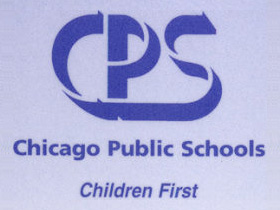| « Chicago Neighborhood Development Awards Honors Projects, Recognizes Challenges | "Strike for America" Honest, Detailed Chronicle of CTU Strike » |
Education Mon Feb 24 2014
CPS Schools Move Away From Zero-Tolerance Discipline Policies
 Last Tuesday, Rahm Emanuel and Chicago Public Schools CEO Barbara Byrd-Bennett showed off changes in discipline policy in Chicago schools, claiming CPS schools have been successfully moving away from zero-tolerance discipline, toward a more holistic approach where, according to Byrd-Bennett in a DNAinfo article, "suspensions must be the last resort."
Last Tuesday, Rahm Emanuel and Chicago Public Schools CEO Barbara Byrd-Bennett showed off changes in discipline policy in Chicago schools, claiming CPS schools have been successfully moving away from zero-tolerance discipline, toward a more holistic approach where, according to Byrd-Bennett in a DNAinfo article, "suspensions must be the last resort."
Emanuel and Byrd-Bennett argue that the new initiative in Chicago focuses on being proactive, rather than reactive in terms of student behavior. According to Emanuel and Byrd-Bennett, the policy de-emphasizes mandatory punishment rules, and instead focuses on fostering community through teacher and peer involvement.
CPS reports that suspensions are down 36 percent from three years ago. However, the district has not provided specific information on suspension reductions by school, so it is not yet evident what these numbers are based upon. Emanuel and Byrd-Bennett cited Wells High School as the prime example of the success of the new policy--during the past year the school has cut suspensions in half.
Chicago's new approach to discipline began in 2012 as part of the Student Code of Conduct issued that year, and was advanced in response to a recommendation from the Obama Administration to move away from zero-tolerance discipline in U.S. schools. The administration recently released guidelines, which propose moving away from suspension, expulsion or arrest and instead emphasize approaches such as counseling and working with teachers and students; essentially working to create lasting solutions that keep students in school rather than out.
For many students and advocates in Chicago and throughout the country, disciplinary changes have been a long time coming. Civil rights proponents argue that zero-tolerance discipline policies unfairly target students of color and encourage the development of the school-to-prison pipeline. The Associated Press reported the American Civil Liberties Union, which had been fighting for discipline policy reform, called the Obama Administration's recommendations "groundbreaking."
In this vein, a large part of the problem with the zero tolerance policy in Chicago was its disproportionate targeting of students of color. A recent report [PDF] by the National Office for Civil Rights showed that black students in Chicago schools comprised 76 percent of suspensions, even though they only made up 45 percent of the student body.
At the same time, white students only accounted for three percent of suspensions, while they made up nine percent of student enrollment. This means that black students are 11 times as likely to be suspended as white students.
Additionally, students with disabilities are more likely to be targeted for harsh punishments. Together these factors resulted in over 25 percent of black students with disabilities being suspended in the 2009-10 school year in Illinois. And there is evidence that policies that remove students encourage them to abandon school, rather than improving antisocial or disruptive behavior. Additionally, continuing to employ the same punitive measures, such as suspending students, does nothing to address the biases inherent in educators' disparities in punishment.
Due to this discrimination, student groups in Chicago, along with the Illinois Safe Schools Alliance, backed the changes in policy as a move away from prejudicial treatment against black students and students with disabilities. To this end, University of Chicago held a symposium last weekend where they attempted to address the criminalization of black youth in Chicago. The summit's aim was to find alternative solutions to issues faced by black youth, including schools' overuse of suspensions.
As of yet, Chicago's charter schools have not joined CPS in formally changing their discipline policies. Charter schools have been heavily criticized for their extreme disciplinary measures. Last year, Noble Charter Schools (which run twelve schools in Chicago) were forced to pay fines after their disciplinary policies came under fire. As Education Week reported, "At Noble, students receive demerits for certain offenses, including dress-code violations or possessing a permanent marker. Racking up four demerits means serving detention for three hours on Friday and paying a $5 fee."
Student groups have also protested harsh expulsion and suspension policies in Chicago charter schools.
The Emanuel Administration has pushed unprecedented expansion of charter schools in the city (at the same time as shuttering 50 public schools last year); this raises the question of whether changes in discipline policy can be considered a true victory until Emanuel works with the charters to extend the new strategies into their schools.
It appears that the mayor and the CPS administration are at least moving in the right direction when it comes to disciplinary policy. Yet until more evidence is available, it remains to be seen whether changes will be merely cosmetic, or whether the culture of punishment and targeting at Chicago schools will truly be rooted out. It seems clear that in order to keep students in school and motivate them to reach their highest potential, disciplinary solutions should target root causes of disruptive behavior, along with the demonstrated biases of CPS educators that result in disparities in meting out punishment. In all but extreme cases, simply taking children out of school does not provide a lasting solution to a problem.











